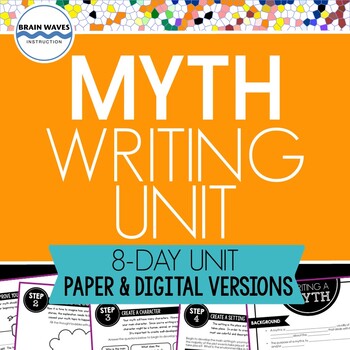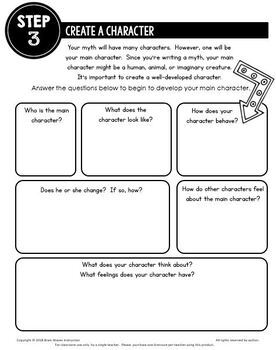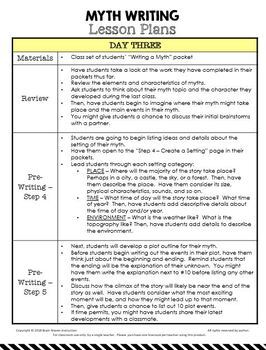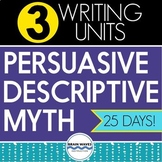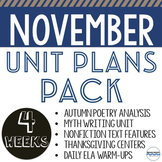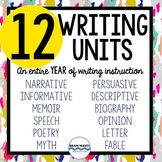Myth Writing Unit - 8 days of writing lessons! (PDF and Digital Versions)
- PDF
- Google Apps™

What educators are saying
Also included in
- Save and help your students develop the craft of writing with this Writing Unit Bundle! The bundle includes a Persuasive Writing Unit, Descriptive Writing Unit, and Myth Writing Unit...over 25 days of instruction!Digital Version Included - The writing units in this resource include a traditional PDPrice $19.99Original Price $23.97Save $3.98
- Help students learn critical skills in reading, writing, listening, and speaking this November with this bundle of resources. This bundle includes five resources that perfectly pair together, celebrate the time of year, AND help students learn a ton of skills in just 20 days! The best part? It’s aPrice $32.99Original Price $37.95Save $4.96
- Save BIG with this set of 12 writing units! Meet every single writing standard as students progress through 12 engaging and detailed units. This writing unit bundle includes units for Narrative, Expository, Persuasive, Descriptive, Memoir, Biography, Speech, Opinion, Poetry, Letter, Myth, and FablPrice $99.99Original Price $113.38Save $13.39
Description
In this eight day, CCSS-aligned Myth Writing Unit, students will demonstrate an understanding of the myth genre as they write their own myths. The unit begins with a review of the characteristics of myths and student analysis of a sample myth. Then, following a step-by-step process that includes pre-writing, writing, revising, editing, conferencing, and then writing a final copy, students will write an original and creative myth. In this unit students create a myth that creatively presents an explanation of an unknown. In addition, students’ myths will be filled with genre characteristics as well as strong voice and word choice.
This unit is a perfect addition to a myth study unit , an Ancient Greece unit, or as a stand alone writing unit.
Digital Version Included - This resource includes a traditional PDF version of the student writing packet, as well as a link for Google Slides. This means that this resource is ready for Google Classroom! The digital version of the packet is accessible from any computer and allows students to complete their work online. You’ll find links for digital versions of the student writing packet and the grading rubric included with this resource.
*** Great News! This unit is included in this set of 3 writing units!. Click HERE to check out and SAVE on the bundle of Persuasive, Descriptive and Myth writing units! (25 days of writing instruction!) ***
Step-by-Step Writing Process Materials in this Unit
- Step 1: Choosing the Unknown (Topic Brainstorm)
- Step 2: Explaining the Unknown
- Step 3: Pre-Write – Create a Character
- Step 4: Pre-Write – Create a Setting
- Step 5: Pre-Write – Create a Plot Outline
- Step 6: First Draft – Write a Myth
- Step 7: Revisions – Improve the Beginning
- Step 8: Revisions – Add Dialogue
- Step 9: Second Draft
- Step 10: Editing Tasks
- Step 11: Peer Conferences
- Step 12: Write Final Copy
Common Core State Standards:
- RL.1, RL.2, RL.3
- W.3, W.3a, W.3b, W.3c, W.3d, W.3e, W.4, W.5, W.10
- L.1, L.2, L.3, L.5
- SL.1
Skills:
- Reading and Analysis
- Plot Development
- Characterization
- Sensory Details
- Dialogue
- Writing Process: Pre-Writing, Drafting, Revising, Editing, Publishing
This detailed unit includes:
- Unit Overview
- Detailed Lesson Plans (8)
- Myth Rubric
- Student Packet: ---Building Background Notes ---Example Myth and Analysis ---Pre-Writes (5) ---Revision Notes and Guides ----Editing Tasks ---Peer Conference Feedback Forms
- Teacher Keys: ---Notes - Background and Writing a Myth ---Student Work – Reacting to the Reading ---Revision examples - Leads and Dialogue
FYI: This unit is also a part of a Writing Unit Bundle. The bundle is filled with 12 Writing Units - everything you'll need for an entire year of writing instruction! You can check it out HERE.
You may also like…
- Reading Response Project - Any Book! - Create a Newspaper
- Memoir Study and Writing Unit
- Poetry Analysis Unit - 5 Poems and 20 Analysis Tasks
- Daily Doodle Vocabulary
Following is Fun!
Get the inside scoop on all store discounts, free products, and product launches. Just Get the inside scoop on all store discounts, free products, and product launches. Just click the green “Follow Me” star under my store name on this page or click the green “Follow Me” star on my store homepage.
Let’s Stay in Touch!
*** Click HERE to receive the Brain Waves Instruction Newsletter filled with exclusive FREEBIES and Teaching Tips!
Thanks!
Brain Waves Instruction

